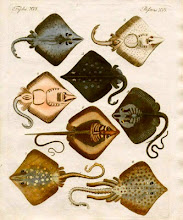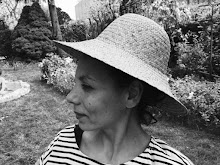Thursday, April 13, 2006
Frank O'Hara [ 2 extracts]
IN MEMORY OF MY FEELINGS
My quietness has a man in it, he is transparent
and he carries me quietly, like a gondola, through the streets.
He has several likenesses, like stars and years, like numerals.
My quietness has a number of naked selves,
so many pistols I have borrowed to protect myselves
from creatures who too readily recognize my weapons
and have murder in their heart!
though in winter
they are warm as roses, in the desert
taste of chilled anisette.
Grace
to be born and live as variously as possible. The conception
of the masque barely suggests the sordid identifications.
I am a Hittie in love with a horse. I don’t know what blood’s
in me I feel like an African prince I am a girl walking downstairs
in a red pleated dress with heels I am a champion taking a fall
I am a jockey with a sprained ass-hole I am the light mist
in which a face appears
and it is another face of blonde I am a baboon eating a banana
I am a dictator looking at his wife I am a doctor eating a child
And the child’s mother smiling I am a Chinaman climbing a mountain
I am a child smelling his father’s underwear I am an Indian
sleeping on a scalp
and my pony is stamping in the birches,
and I’ve just caught sight of the Niña, the Pinta and the Santa Maria.
What land is this, so free?
And now it is the serpent’s turn.
I am not quite you, but almost, the opposite of visionary. . .
And yet
I have forgotten my loves, and chiefly that one, the cancerous
statue which my body could no longer contain,
against my will
against my love
become art,
I could not change it into history
and so remember it,
and I have lost what is always and everywhere
present, the scene of my selves, the occasion of these ruses,
which I myself and singly must now kill
and save the serpent in their midst.
(Poems 252-257)
* * *
from PERSONISM: A MANIFESTO [on Poetry]
Everything is in the poems, but at the risk of sounding like the poor wealthy man’s Allen Ginsberg I will write to you because I just heard that one of my fellow poets thinks that a poem of mine that can’t be got at one reading is because I was confused too. Now, come on. I don’t believe in god, so I don’t have to make elaborately sounded structures. I hate Vachel Lindsay, always have, I don’t even like rhythm, assonance, all that stuff. You just go on your nerve. If someone’s chasing you down the street with a knife you just run, you don’t turn around and shout, "Give it up! I was a track star for Mineola Prep."
That’s for the writing poems part. As for their reception, suppose you’re in love and someone’s mistreating (mal aimé) you, you don’t say, "Hey, you can’t hurt me this way, I care!" you just let all the different bodies fall where they may, and they always do ‘flay after a few months. But that’s not why you fell in love in the first place, just to hang onto life, so you have to take your chances and try to avoid being logical. Pain always produces logic, which is very bad for you.
I’m not saying that I don’t have practically the most lofty ideas of anyone writing today, but what difference does that make? they’re just ideas. The only good thing about it is that when I get lofty enough I’ve stopped thinking and that’s when refreshment arrives.
But how can you really care if anybody gets it, or gets what it means, or if it improves them. Improves them for what? for death? Why hurry them along? Too many poets act like a middle-aged mother trying to get her kids to eat too much cooked meat, and potatoes with drippings (tears). I don’t give a damn whether you eat or not. Forced feeding leads to excessive thinness (effete). Nobody should experience anything they don’t need to, if they don’t need poetry bully for them, I like the movies too. And all, only Whitman and Crane and Williams, of the American are better than the movies. As for measure and other technical apparatus, that’s just common sense: if you’re going to buy a pair of pants you want them to be tight enough so everyone will want to go to bed with you. There’s nothing metaphysical about it. Unless of course, you flatter yourself into thinking that what You’re experiencing is "yearning."
Abstraction in poetry, which Allen recently commented on in It is, is intriguing. I think it appears mostly in the minute particu1ars where decision is necessary. Abstraction (in poetry, not in painting) involves personal removal by the poet. For instance, the decision involved in the choice between "the nostalgia of the infinite" and "the nostalgia for the infinite" defines an attitude toward degree of abstraction. The nostalgia of the infinite representing the greater degree of abstraction, removal, and negative capability (as in Keats and Mallarmé). Personism, a movement which I recently founded and which nobody yet knows about, interests me a great deal, being so totally opposed to this kind of abstract removal that it is verging on a true abstraction for the first time, really, in the history of poetry. Personism is to Wallace Stevens what la poésie pure was to Béranger. Personism has nothing to do with philosophy, it’s all art. It does not have to do with personality or intimacy, far from it! But to give you a vague idea, one of its minimal aspects is to address itself to one person (other than the poet himself), thus evoking overtones of love without destroying love’s life-giving vulgarity, and sustaining the poet’s feelings towards the poem while preventing love from distracting him into feeling about the person. That’s part of personism. It was founded by me after lunch with LeRoi Jones on August 27, 1959, a day in which I was in love with someone (not Roi, by the way, a blond). I went back to work and wrote a poem for this person. While I was writing it I was realizing that if I wanted to I could use the telephone instead of writing the poem, and so Personism was born. It’s a very exciting movement which will undoubtedly have lots of adherents. It puts the poem squarely between the poet and the person, Lucky Pierre style, and the poem is correspondingly gratified. The poem is at last between two persons instead of two pages.
Subscribe to:
Post Comments (Atom)




No comments:
Post a Comment